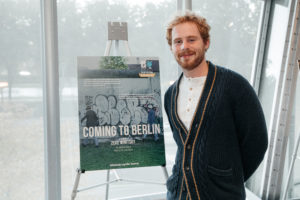
Zeke Winitsky was never supposed to travel to Berlin, let alone shoot a short film there.
The Pennsylvania State University student and South Philadelphia resident was planning to spend his summer semester in Japan, but when the program was canceled due to COVID, Winitsky decided to instead travel to Berlin, a city his Holocaust survivor grandfather refused to visit after World War II.
“Before going, my grandfather, a survivor, was a little wary,” Winitsky said. “We thought it was a good idea for me to go and travel. …I have a lot of interesting feelings about it, but I honestly think I didn’t really understand those things until I got there.”
Surrounded by memorials of the Shoah and feeling the pressure of his grandfather’s survivor status to make the most of the semester as a Jew in Germany, Winitsky, 21, felt he “had the ghost of the Holocaust on my shoulder,” he said.
Winitsky’s tug-of-war desire to explore the city while also honoring the legacy of the Holocaust resulted in a six-minute short film entitled “Coming to Berlin.” The film, investigating the significance of public memory of the Holocaust, won the grand prize at the Institute for the International Education of Students Study Abroad Film Festival in Chicago on Oct. 13.
“There’s pictures of my grandfather and references to my grandfather in that film,” Winitsky said in his acceptance speech. “We actually lost my grandfather two weeks ago, and he inspired me so much in so many different ways specially to make this film. One piece of advice that he always gave me, and I think I can relate to everyone here, is that love is easier than hate, and I think that was a lot of the conclusions I came to when making this movie.”
“Coming to Berlin” mirrors the internal dialogue Winitsky found himself having over the course of the summer semester through the IES Abroad program, a nonprofit offering internships and study abroad programs for college students.
Attending Temple Beth Zion-Beth Israel and and growing up lighting the Shabbat candles every Friday night, Winitsky was instilled with deep Jewish pride, but as part of a generation more removed from the Holocaust, he has had to find his own ways to honor his family’s Jewish history.
In the film, the audience sees two Winitskys: One in a slouched Grateful Dead baseball cap and beaten Reebok sneakers, and the other in a white dress shirt tucked into his trousers, a wide-brimmed hat donning his head. The modern-day Winitsky meets the version of himself from a universe where the Shoah never happened.
The two travel across the city, to the Berlin Wall and the Memorial to the Murdered Jews of Europe, debating the impact of the structures and the best way to mark or move forward from the Holocaust.
Winitsky’s complicated feelings towards Holocaust memorials are reflected in his greater philosophy around Jewish history, memory and film.
“I’m just more interested in Jewish life than Jewish death,” he said. “And seeing how many movies are so concerned with Jewish death and the minutiae of how they were killed and the tragedy of how they’re killed — Of course, that’s important to remember. But I think that there are times that actually warrant us to look at what was lost. What was there that was taken?”
Winitsky’s grandfather, known to the family as “Jewish Forrest Gump,” showed Winitsky a prime example of a rich Jewish life. Born in Hungary, the patriarch was taken to a labor prison and later Bergen-Belsen concentration camp as a child, but avoided a death camp because his well-educated mother spoke German and served as the de facto translator between the Nazi guards and their Jewish prisoners.
After the war, the survivor went to Israel with his mother and siblings, but was separated from his mother and sent to an orphanage until he was old enough to go to yeshiva. He later served as a paratrooper in the Israel Defense Forces and was a bodyguard to Moshe Dayan.
When he settled in Pittsburgh in the later years of his life and became a jeweler, he survived the Tree of Life synagogue shooting. He found it important to speak to school children about his experience surviving the Holocaust.
Beyond being an inspiration to his grandson, Winitsky’s grandfather also encouraged Winitsky to pursue film.
“My grandfather considered art to be the highest of the high, the holiest of professions,” Winitsky said.
Becoming an artist was a way to make the biggest mark on society. Both of Winitsky’s parents are artists, and as Winitsky gains experience and influence as a filmmaker, he draws on the Talmudic teaching that his grandfather believed in: “You could create something from something, and that is good. But it’s holier to create something from nothing.”






